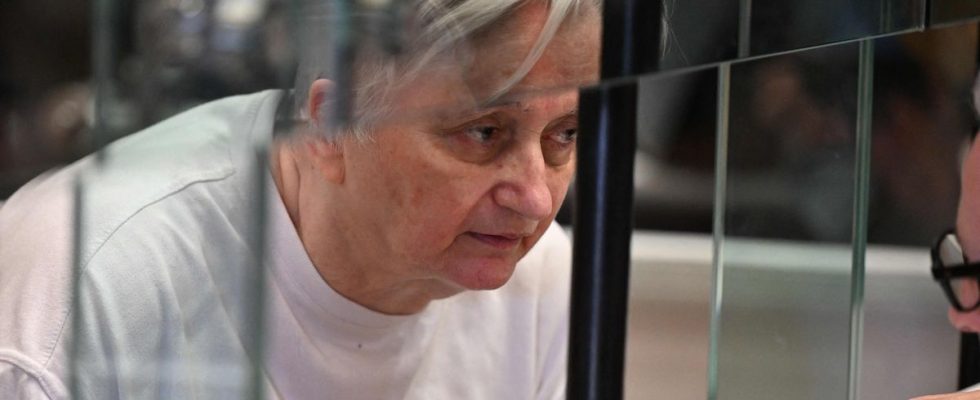At the Hauts-de-Seine assize court,
What’s in Monique Olivier’s head? The question occupied, on Tuesday, the debates of the Hauts-de-Seine Assize Court before which the widow of Michel Fourniret is being tried for complicity in the kidnappings and murders of two young women, Marie-Angèle Domèce and Joanna Parrish, and a child, Estelle Mouzin. Once again, the 75-year-old accused, dressed in the same white sweatshirt as the previous days, remains impassive – but attentive – in front of the parade of psychological experts who come to speak about her on the stand. Should we still deign to question her and make her react? In her cubicle, she sometimes nods when she does not agree with their analyses. That’s all.
Was she under the influence of the serial killer who used her to commit his crimes? Did she encourage him, in one way or another, to take action? Why so much silence? If his guilt is already acquired and admitted, his degree of involvement in the actions of the serial killer and his motivations still remain to be clarified. And if the jurors were counting on this collection of experts to help them better understand the personality of Monique Olivier, it was probably missed. What is it intellectually possible to learn from these thirteen hours spent listening to specialists disinclined to make an educational effort? Some formulas that ring hollow, slightly complicated words, catch-all concepts. Suffice it to say, not much, and that’s a shame.
Interrogations too long and too numerous
Above all, we will remember that they do not often agree with each other. Even that they hate each other. That some lacked seriousness and method in their work. That, after 8 p.m., it should not be allowed to project tables full of figures and curves onto screens in a courtroom. That the experts should be forced to make their opening remarks in around twenty minutes maximum and oblige them to popularize their explanations – the jurors do not all have a doctorate in psychology or scientific fiber. And that spreading the interrogations over several days of hearing, to avoid indigestion and a loss of interest, would not be a luxury that justice should afford.
President Didier Safar decided to question the experts in chronological order. From oldest to newest. So here we are back in 2004. At the time, the Belgian psychologist, Gauthier Pirson, assessed the accused and assessed her IQ at 95. He sees Monique Olivier as a woman who is “dependent, quite passive, submissive”, “rather manipulatable”. “, having “little empathy”, except towards herself. “The submission report with regard to Michel Fourniret” explains, he says, his participation in the crimes of the ogre of the Ardennes.
Superior intelligence for some…
A year later, in 2005, it was a French expert, Philippe Herbelot, who met Monique Olivier. He gave her an IQ test and got a result of 131. “You can’t fake superior intelligence. The tests are done this way,” he assures. Which makes her a genius. This astonishing result does not surprise him more than that. According to him, the accused allowed the serial killer to “develop his criminal madness”. She was “the assistant, the one who passes the tools”. If she did not leave him, it was because she was “afraid” of “finding herself homeless”: “She stayed with him to have the assurance of having room and board. » He also notes the absence of “feeling of guilt” in her.
Jean-Luc Ployé was required to examine Monique Olivier as part of a psychological expertise ordered by the two investigating judges of Charleville-Mézières. He submitted his report in 2005, at the same time as Philippe Herbelot and “consulted” with the latter. “Monique Olivier has a capacity for adaptation, even concealment, which is structured,” he assures. For him, the couple worked “like two muscles in synergy. When one doesn’t work, the other replenishes it.” He goes further than his predecessor and does not “totally” exclude that she could have found “perverse pleasure” in helping Michel Fourniret find victims.
In the low average for the others
Colette Prouvost, expert psychologist “does not think that Monique Olivier obeyed her husband”. “She was an actress like him. She felt pleasure. Being her muse, her collaborator gave her an importance like she had never had,” she analyzes after meeting her in 2018.
At 8 p.m., Mickael Morlet-Rivelli, who was recently tasked by judge Sabine Khéris with assessing the intelligence of the accused, charges against his colleagues. The expert, who met Monique Olivier for thirty-eight hours, is certain of it. Her IQ is not 131 but is in the “low average”, at 92. A result close to that obtained by the Belgian expert in 2004. The French psychologists who examined her, he explains in substance, did anything, or at least did not use scientifically valid methods.
A mystery that remains unsolved
He describes a woman who is “self-effacing, reserved, naive and easily influenced”, “avoidant and dependent”, “invisible, insignificant”, who suffers from significant “emotional deficiencies”. Her profile is close to that of a woman victim of domestic violence. She was, he explains, under the influence of the killer. You have to hang on a little, but this expert deserves to raise the level by having provided in-depth, serious and complete work.
After a series of more or less relevant questions from the civil parties and the attorneys general, the president finally suspends the hearing. It’s after 11 p.m. Submissive woman ? Perverted manipulator? Monique Olivier was a mystery. This night, it still remains.

